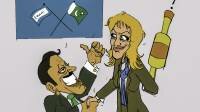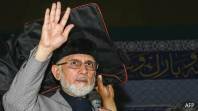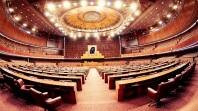Cultural events funded by foreign governments are an annual occurrence in this country now. Conducted under the ambit of cultural diplomacy and meant to promote a softer image of Pakistan both at home and abroad, these events attract good crowds and even better press; every foreign journalist covering the proceedings is, as a rule, accompanied by a helpful band of local ones.
Foreign governments also spend billions of dollars in aid every year channeled through international and national NGOs, not just taking up social development projects but also cultural preservation projects; soft culture and cultural diplomacy being the buzzwords of modern foreign aid.
The Italian embassy in Islamabad, for example, was one of the primary sponsors for the annual Islamabad Literature Festival this year, as was the French embassy for the Karachi Literature Festival. Last year, the French embassy sponsored a World Music Festival in the three major urban centers of Pakistan. The Italian embassy has also, over the past many years, sponsored gallery shows, musical evenings, theater and assorted events at the Pakistan National Council of Arts (PNCA) in Islamabad.
They have been directly funding the Italian archeological mission in places like Swat for decades. The excavation is conducted by an Italian archeologist, the cultural artifacts studied by Italian anthropologists. The papers written and academic journal entries that follow are used to further their careers.
It wouldn’t be cynical to suggest that developing countries are a lucrative prospect for foreign research workers, academics, anthropologists, journalists, artists, writers and even diplomats. They pick up hefty hardship allowances for coming to dangerous countries such as ours, and also get the kind of preferential access to government institutions, archives, and place they might not receive in more developed countries, even their own.
Certainly not in terms of regulatory exemptions; at the end of May this year, under pressure from many diplomatic missions in the country, the government deferred a decision to bring international NGOs under the tax net.
At the moment, these NGOs aren’t even required to file returns detailing income and expenditure. FBR sources said that the European Union (EU) had been pressing Pakistan not to tax these NGOs as they were carrying out benign activities for development, social welfare, and cultural diplomacy.
Cultural diplomacy; the idea being that language, music, arts and anthropology based enterprises is an exchange of cultural ideas and establishment of projects that foster a greater understanding between nations, in the hope of facilitating state level diplomacy, as well as economic and political ties.
It is curious then, that many of these countries flying the flag of cultural diplomacy are also the ones putting down actual diplomatic missions from Pakistan in forums like the EU Parliament. Here’s something that muddles the narrative on cultural diplomacy: the aforementioned culturally diplomatic nations of Italy and France were the first, among an eventual 12 countries, to oppose the granting of Generalised System of Preferences (GSP) Plus status to Pakistan, by the EU.
The much awaited trade concessions, expected to bolster Pakistan’s exports by a total of 1.5 billion dollars – in assorted trade items such as textile garments, hosiery, ethyl alcohol, footwear and leather products – were finally granted, after a one year delay, at the beginning of January this year.
But even as far as November in 2013, chances of EU granting GSP Plus status to Pakistan looked very slim. Sources in the Ministry of Commerce say that opposition from countries like France and Italy was fierce. “We were informed by the British Foreign Secretary William Hague, and EU Parliamentarian David Martin that an opposition block was forming among certain EU members. The UK was the only member nation, in addition to Germany, really pushing Pakistan’s case,” explains a senior official inside the ministry.
“By September, we were telling an All Pakistan Textile Mills Association (APTMA) delegation that Pakistan will likely not get the GSP Plus status. When I see all these cultural initiatives taken by the same countries rallying against trade concessions to Pakistan, I have to wonder if we know who our friends really are,” he continues.
This opposition in economic aid and exchange isn’t something new. Two months after member states of the EU had decided to grant flood-hit Pakistan temporary trade concessions in 2011, the EU commission’s proposal ran into opposition from France, Italy, Portugal and Spain, which have significant textiles sectors.
It was again the UK Foreign Secretary William Hague expressing concerns over some countries wanting to, “Dilute the EU’s commitment to development in the region.”
The aid package that was finalized was significantly weaker the one originally proposed.
If cultural diplomacy is meant to strengthen an economic and political understanding between nations, all three seem to be functioning on a disparate and mutually exclusive level in Pakistan. The only understanding that still prevails is that of hard diplomacy based on balance of trade and dangling the proverbial carrot.
“The GSP Plus granted to Pakistan is conditional on the implementation of 27 international conventions in the areas of human rights, labour standards, environment and good governance,” says another official from the commerce ministry.
While the government of Pakistan is busy ratifying these conditions, the EU has a strict monitoring policy through diplomatic missions, third party endeavours and NGOs.
Since awarding the GSP Plus, the EU has already publicly announced disapproval for the Pakistan Protection Ordinance (PPO) and the PEMRA notice against Geo Television, citing potential civil rights violations and freedom of press.
Not to mention problems with the 18th amendment. Earlier this year EU officials bemoaned Pakistan’s lack of capacity to enforce the International Labour Organisation (ILO) Convention, which is a basic requirement to continue with the GSP Plus status. In statements issued by EU parliamentarians, they feared that after labour had been devolved, as a subject, to the provinces, they were uncertain whether provincial governments have the ability to implement the ILO Convention.
While liberal, rationalist elements in the country are entirely against the PPP and banning media organizations, the idea of a trade concession being used as leverage over internal matters of Pakistan is concerning for two reasons. Firstly, western alliances have not been shy of supporting undemocratic leadership in Pakistan in the past, as a matter of expedience for their global skirmishes. A selective requirement on upholding civil liberties suggests both hypocrisy and vested interests.
Secondly, such politicization of matters of trade puts enormous pressures on the commerce ministry and trade interest groups in the country, who are also bound to the internal political and security dynamics, which affects performance and output. Indeed, few of the GSP Plus’ initially predicted benefits have actually accrued to Pakistan’s exports.
All this leads to a rather pressing question, who exactly is cultural diplomacy for? Promoting a softer image of Pakistan abroad hasn’t helped bolster economic or political ties, it hasn’t made getting trade concessions easier, it hasn’t alleviated political pressures.
Perhaps the point of cultural diplomacy then, is promote a softer image of foreign countries here, so that economic and political control will be viewed as benign help, instead of heavy-handed interference.
The writer is a journalist based in Lahore.



















